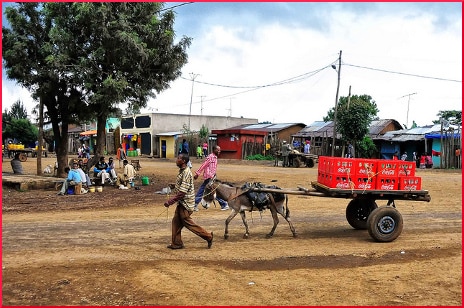
Devotion to covering everything Coca-Cola does around the world would devour the entire workday. Nothing else would get done. But they are always up to something, somewhere. Catch up with the mega corporation’s doings in developing countries, and in some well-established ones like South Africa and Australia.
In Brazil, the three local soda behemoths (Coke, Pepsi, and Brazilian Ambev) were somehow persuaded or pressured to make a pact in which they agreed not to sell sugar-sweetened beverages inside school buildings, to kids under 12. The photo on this page, incidentally, depicts the willingness of Coke to cooperate with local delivery systems, though not necessarily in Brazil. The location of the photo is unknown.
When a business incurs too much criticism, it will sometimes conclude that the best course is conciliation, at least temporarily. To perform damage control on what might be seen as a “cave” or a “flip-flop,” or even as a disservice to the stockholders, several options are available. A classic public relations move is to mount up the number-one best justification of all time — kids. Coke had to bloviate about how it really, truly cares about the children.
The spin works differently in different places. South America holds onto a patriarchal tradition, so an effective tactic is to spotlight the importance of ruling the family with a strong authoritarian hand — for the sake of the children. An excerpt from a statement by the company’s PR department illustrates how Coke uses this tactic in Brazil:
During snack time in schools, students have access to the cafeteria without parental guidance, and kids under 12 years old don’t have enough maturity to take conscious consumption decisions.
This was part of a company statement that supposedly ushers in a “radical change” — although the agreement will still allow the sale of dairy drinks, juices, coconut water, and mineral water in schools, so plenty of money will still be made. But in order to save face, and assure stockholders that profits are all-important, the corporation bowed before an even more vital principle: a father’s right to oversee what a child consumes. Thus the key words, “without parental guidance.”
Or maybe this view is too cynical. Maybe Brazil’s soft-drink CEOs truly are concerned that the childhood obesity rate has tripled since 1974. Maybe they really do care that one-third of the kids between five and nine are overweight. Which leads to a thought that a patriarchal country might want to consider. In the childhood obesity ratings, boys are worse off than girls by about five percentage points. Apparently, the boys are not playing as much soccer as the North American media leads us to believe.
The immaturity argument
But what about the other part of the statement? Coke said, that “[…] kids under 12 years old don’t have enough maturity to take conscious consumption decisions.” If that is the case, may we assume that the beverage cartel will cease all advertising that targets children under 12, in all media, in Brazil and everywhere else? It’s only logical. If kids are incapable of making the right decisions, especially without parental guidance, wouldn’t that imply that Big Soda should immediately stop wasting all those millions of dollars they spend on ads aimed at children?
But no. It’s just another example of corporate double-think. The PR geniuses cooked up something that sounds good, to fit a particular need, and plugged it into the copy. The same logic byte would serve none of the company’s other interests, but who cares? It doesn’t need to make sense, as long as it makes money.
Your responses and feedback are welcome!
Source: “Coca-Cola to stop being sold in Brazilian schools,” Plus55.com, 06/23/16
Photo credit: Rod Waddington via Visualhunt/CC BY-SA

 FAQs and Media Requests:
FAQs and Media Requests: 











